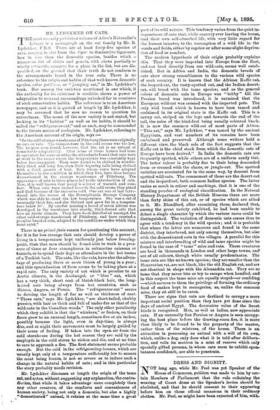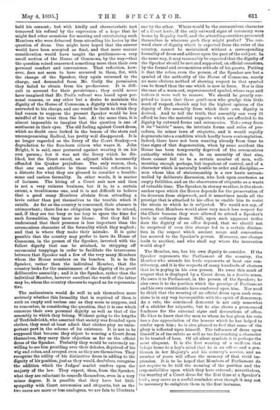DRESS AND DIGNITY.
NOT long ago, while Mr. Peel was yet Speaker of the- House of Commons, petition was made to him by cer- tain Members of Parliament that the rule ordaining the wearing of Court dress at the Speaker's levees should be abolished, and that he should consent to their appearing before him on those official occasions in their ordinary clothes. Mr. Peel, as might have been expected of him,
held his consent; but with kindly and characteristic tact tempered his refusal by the expression of a hope that he might find other occasions for meeting and entertaining such Members who were debarred from attending his levees by the question of dress. One might have hoped that the answer would have been accepted as final, and that more mature consideration would have taught the petitioners—a very small section of the House of Commons, by the way—that the question raised concerned something more than their own personal comfort and convenience. That reflection, how- ever, does not seem to have occurred to them, for, with the change of the Speaker, they again returned to the charge, and demanded from Mr. Gully the permission they failed to obtain from his predecessor. It is diffi- cult to account for their persistence ; they could never have imagined that Mr. Peel's refusal was based upon per- sonal reasons, or any other but a desire to maintain the dignity of the House of Commons, a. dignity which was then entrusted to his charge, and one would be loath to think they had reason to suppose the present Speaker would be lees mindful of his trust than the last. At the same time, it is almost impossible to imagine that the question is one of sentiment in their eyes. The old feeling against Court dress, which no doubt once lurked in the bosom of the stern and uncompromising Radical, has pretty well disappeared. It is no longer regarded as the livery of the Court flunkey,—a -degradation to the free-born citizen who wears it. John Bright, it is said, once protested against wearing it on his -own person ; but it was not the livery which he dis- liked, but the Court sword, an adjunct which necessarily .offended his Quaker prejudices. The only reason, then, that one can attribute to these would-be reformers is -a distaste for what they are pleased to consider a trouble- some and useless formality. In other words, it is matter of laziness. The hiring of a Court suit now and then is not a very ruinous business, but it is, to a certain extent, a troublesome one, and it is not difficult to believe that a good many Members abstain from attending a levee rather than put themselves to the trouble which it entails. As far as the country is concerned, their absence is unimportant ; there lies no obligation upon them to attend, and, if they are too busy or too lazy to spare the time for such formalities, they incur no blame. But they fail to understand that their presence is less important than the ceremonious character of the formality which they neglect ; and that is where they make their mistake. It is quite possible that the country may prefer to have its House of Commons, in the person of the Speaker, invested with the fullest dignity that can be attained, to stripping off ceremonial trappings in order to facilitate the intercourse between that Speaker and a few of the very many Members whom the House numbers on its benches. It is to the Speaker, rather than the individual Member, that the -country looks for the maintenance of the dignity of its great deliberative assembly ; and it is the Speaker, rather than the individual Member, however excellent the worth of the latter may be, whom the country chooses to regard as its representa- tive.
The malcontents would do well to ask themselves more seriously whether this formality that is required of them is each an empty and useless one as they seem to suppose, and to remember, in considering the question, that it is one which -concerns their own personal dignity as well as that of the assembly to which they belong. Without going to the lengths -of Teufelsdrockh, who asserted that society was founded upon clothes, they must at least admit that clothes play no unim- portant part in the scheme of its existence. It is not to be supposed that because they object to wearing a Court dress themselves, they carry their objection as far as the official dress of the Speaker. Probably they would be extremely un- willing to see him presiding over their debates, deprived of his wig and robes, and arrayed even as they are themselves. They recognise the utility of his distinctive dress in adding to the dignity of his position, just as they would, doubtless, recognise the addition which the Judges' scarlet confers upon the majesty of the law. They expect, then, from the Speaker, what they are reluctant to concede themselves, even in a very minor degree. It is possible that they have but little sympathy with Court ceremonies and etiquette, but as the two cases are more or less analogous, we are fain to illustrate
one by the other. Where would be the ceremonious character of a Court levee, if the only outward signs of ceremony were borne by Royalty itself, and the attending courtiers presented themselves in whatever garb they might prefer? The out- ward show of dignity which is expected from the ruler of the
country, cannot be maintained without a corresponding formality of dress and address upon the part of the subject. In the same way, it may reasonably be expected that the dignity of the Speaker should be met and supported, on official occasions, by the formal and ceremonious attitude of his guests. Putting it that the robes, even the person, of the Speaker are but a symbol of the authority of the House of Commons, surely no more obvious method of showing respect to that symbol can be found than the one which is now in force. Nor is this the case of a worn-out, superannuated symbol, whose raga and tatters it were well to remove. We should be greatly sur- prised to learn that these gentlemen who grudge this little mark of respect, cherish any but the highest opinion of the dignity of the assembly from -which their own dignity is derived. And to tell the truth, that assembly can very ill afford to lose the material supports which are afforded to its dignity by outward forms and ceremonies. Take away from it its "bauble" mace, its intricate forms and rules of pro- cedure, its minor laws of etiquette, and it would rapidly degenerate into a condition which hardly bears contemplation. Indeed, there have not been wanting already from time to time signs of that degeneration, when by some accident the House has been temporarily deprived of the ceremonious authority which rules it. In an assembly of that size, there cannot fail to be a certain number of men, well- meaning enough perhaps, but impatient of control, and of a character which is naturally hostile to order and discipline,— men whose idea of statesmanship is a raw haste untram- melled by deliberate discussion, who look upon courtesies as empty futilities, and on the observance of etiquette as a waste of valuable time. The Speaker, in stormy weather, is the sheet. anchor upon which the House depends for the preservation of its decorum from shipwreck, and it sometimes needs all the prestige that is attached to his office to enable him to resist the strain to which he is subjected. We would not say, of course, that Members would show very much less respect for the Chair because they were allowed to attend a Speaker's levee in ordinary dress. Still, upon such apparent trifles does the dignity of an office depend, that we should not be surprised if even this change led to a certain diminu- tion in the respect which ancient usage and convention has secured to the Speaker's person. Moreover, one change leads to another, and who shall say where the innovation would stop ?
The Member, too, has his own dignity to consider. If the Speaker represents the Parliament of the country, the Member who attends his levee represents at least one con- stituency, and it is the respects of many hundreds of electors that he is paying in his own person. He owes this mark of respect that is displayed by a Court dress, in a double sense. He owes it to Parliament, in the person of the Speaker ; he also owes it to the position which the prestige of Parliament and his own constituents have conferred upon him. Nor need he think that the wearing of an official dress upon such occa- sions is in any way incompatible with the spirit of democracy. As a rule, the convinced democrat is not only somewhat of a stickler for etiquette, but he also shows a pronounced fondness for the external signs and decorations of office. He likes to know that the man to whom he has given his vote has a due appreciation of the honour which he has helped to confer upon him ; he is also pleased to feel that some of the glory is reflected upon himself. The influence of dress upon
himself is of too subtle as well as too far-reaching a character
to be treated of here. Of all silent symbols it is perhaps the most eloquent. It is the first wearing of a uniform that ings home to a boy's mind that he is an offiPer and a gen. tleman in her Majesty's and his country's service, and no
number of years will efface the memory of that vivid im- pression. It is to be hoped that Members of Parliament do not require to be told the meaning of the position and the responsibilities upon which they have entered ; nevertheless, the wearing of a Court dress for the first time at a Speaker's levee, may serve as a useful reminder, even though it may not be necessary to enlighten them in the first instance.







































 Previous page
Previous page